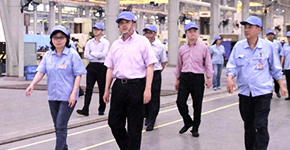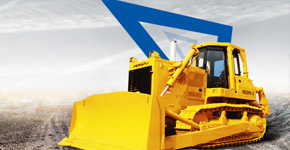Solid waste is not useless waste, but useful resources and valuable wealth. The ultimate solution to solid waste treatment lies in "waste recycling", a philosophy that is becoming a basic policy for waste management systems in countries around the world. In this way, not only can improve social benefits, make the best use of materials, and achieve certain economic benefits, but also achieve the purpose of environmental protection. If handled properly, it has the following uses:
1. After crushing, it is the simplest utilization method and the most commonly used recycling method as a building foundation cushion or road base layer;
2. After crushing, produce concrete block bricks, paving bricks, recycled permeable bricks and other brick products;
3, Replace part of natural sand and gravel aggregate to make recycled aggregate concrete, which is the most valuable treatment method for waste concrete, recycled concrete made with recycled aggregate is a kind of green concrete.


Construction waste refers to the solid waste generated during the demolition, construction and decoration of buildings, including muck soil, concrete blocks, crushed stone, brick and tile fragments, waste mortar, mud, asphalt blocks, waste plastics, waste metal, waste bamboo and wood, etc. For example, at the site of a demolition project in Haizhu District, Guangzhou, mobile temporary facilities are used to recycle demolition construction waste.

At present, most of the construction
waste is transported to the suburbs or villages by the construction unit without any treatment, stacked or landfilled in the open, consuming a large amount of construction funds such as land requisition fees and garbage removal fees, and at the same time, the problems of scattering and dust, gray sand flying in the process of cleaning and stacking have caused serious environmental pollution. (The fine powder and soluble phenolic alkali components of waste concrete are spread underground by wind and rain, which will deteriorate soil and groundwater quality).

Tunnel slag
refers to the stone waste slag excavated during tunnel excavation.
With the development of expressways in China and the emphasis on environmental protection, the proportion of tunnels in mountain
expressways is increasing, and the proportion of tunnels in some mountain expressway tunnels has exceeded 40% of the total length of the route. During the excavation of these tunnels, a large amount of slag is inevitably produced, and due to the influence of construction technology, construction organization and other factors, a large number of tunnel slag cannot be rationally utilized, and it is often necessary to build a special spoil site to be abandoned. Slag disposal not only occupies land resources, but also affects the environment, and sometimes forms a safety hazard due to improper disposal.

In 2016, the Ministry of Transport issued guidance on the implementation of green highway construction, requiring that highway construction should have "zero abandonment and less borrowing", and that the spoil soil in traditional practices should be preserved and utilized, and waste should be turned into treasure.
3. tailings (open-pit stacking).
The portion of the product of a sorting operation in beneficiation that has a low content of useful target components that cannot be used for production is called tailings. Tailings are treasures to be tapped. Experts believe that the current task of China's mining circular economy is to develop and utilize a large number of tailings that have been shelved for a long time.

Gangue is a solid waste emitted during the coal mining process and coal washing process, which is a kind of black-gray rock with lower carbon content and harder than coal associated with coal seam in the process of coal formation. These include excavated gangue during roadway excavation, gangue extracted from the roof, floor and sandwich during mining, and gangue selected during coal washing.


The utilization of solid waste resources is imminent
At present and in the future, China cannot continue to rely on the traditional extensive growth mode to promote the modernization process, we must accelerate the development of circular economy, reduce energy consumption and waste emissions from the source, achieve efficient use and recycling of resources, and promote sustainable and healthy economic and social development. Therefore, the resource utilization of solid waste is imminent.
main process of solid waste resource utilization
• Sorting: removal of large pieces of debris from raw materials by heavy-duty sieving or manually;
• Iron removal: remove small and medium-sized steel bars, iron wires and other impurities;
• Crushing: crushing large aggregates into pellets that meet the requirements of regeneration;
• Sieve: screening classification according to regeneration requirements;
• Winnowing: remove light debris from the aggregate again;
• The whole process is carried out by dust removal technology: spray, fog cannon, film dust suppression, etc.

main equipment for solid waste resource utilization
Crushing is an important process link of solid waste regeneration, and the equipment used more in solid waste treatment at present is mobile crushing plant equipment, which has the following advantages:
• No foundation and supporting construction needs, can be demolition site on-site processing convenient;
• Able to move the station quickly, eliminate the dumping process and reduce the cost of regeneration;
• Flexible combination of supporting facilities under different working conditions to reduce investment costs;
• Simple operation and maintenance of equipment, reducing personnel investment costs;
• The equipment is equipped with sound insulation equipment and dust removal equipment to carry out dust prevention and noise reduction treatment, which has reached the national workshop environmental protection testing standards.

River sand mining banned, sand and gravel industry rectified, sand and gravel shortages, prices soared. The resource utilization of solid waste is particularly urgent, and its recycled materials can replace some artificial and natural sand and gravel aggregates to achieve recycling, or it will become a new opportunity.







 Company News
Company News










